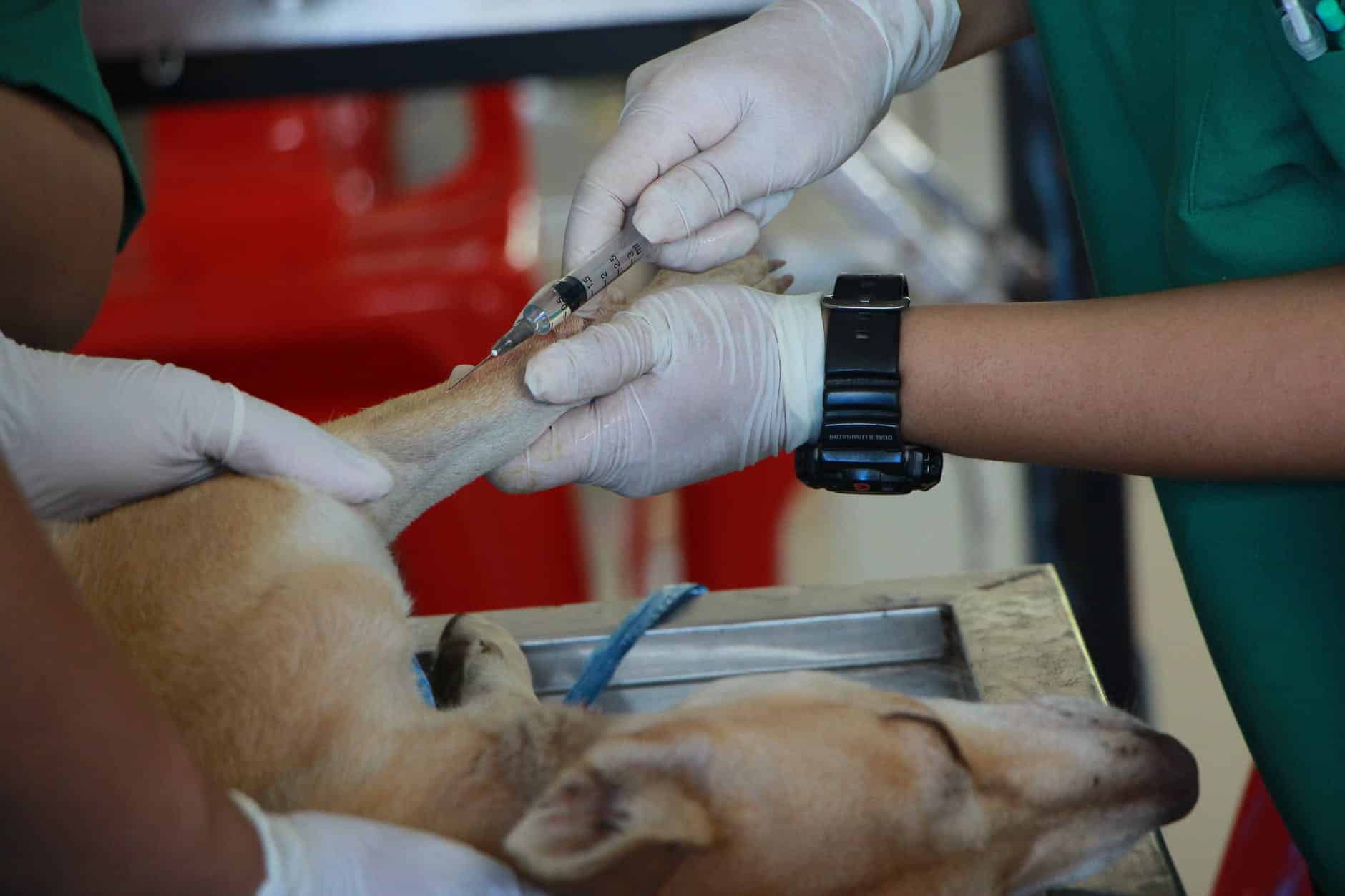Hypocalcemia in dogs is a dangerous condition, however, it is treatable. Calcium helps with muscle contraction, nerve signaling, and blood clotting.
When a dog experiences hypocalcemia, it means that they have low levels of calcium in their blood.
This can cause a variety of dangerous symptoms, which we will discuss in this blog post. We will also talk about the causes of hypocalcemia in dogs and how it is treated.
Hypocalcemia in Dogs

Symptoms of Hypocalcemia
Hypocalcemia in dogs is a dangerous condition that may begin with mild symptoms. This can make it difficult to diagnose, as many people associate low energy and stiffness with aging.
The symptoms of calcium deficiency in dogs include:
- Weakness
- Low energy
- Lethargy
- Lack of appetite
- Poor coordination
- Stiffness
- Cramping or other pain
- Muscle tremors and twitches
- Convulsions
- Seizures
In severe cases, calcium deficiency can lead to death. If you notice any of these clinical signs in your dog, it is important to take them to the vet immediately.
My Great Dane Matilda suffered from life-threatening hypocalcemia caused by unbalanced boutique dog food. I’m sharing her story below!

Why do dogs need calcium?
Calcium is necessary to keep a dog’s bones and teeth healthy.
It is also essential for blood clotting, muscle contraction, and nerve signaling. In large and giant breed dogs, having the correct calcium and phosphorus levels is necessary for bone development and growth.
Poor blood coagulation is another symptom of incorrect calcium in the blood and can lead to devastating issues during surgery. A full blood panel should always be done prior to even the most routine surgical intervention (including spaying or neutering).
Dogs get the majority of their calcium from their diet, and blood calcium levels are then regulated by the parathyroid glands. Sometimes things can go wrong and a dog may not be getting enough calcium, even if the parathyroid hormone levels are at an adequate level.
This can happen for a variety of reasons, including unbalanced nutrition, poor calcium absorption, or deficiencies following whelping.
A blood test is necessary to determine if low blood calcium levels are the culprit.

How do I know if my dog has low calcium?
A dog with low calcium may have low energy levels and may begin to act weak or uncoordinated.
Worsening symptoms include tremors, convulsions, and seizures that may eventually lead to death.
Low calcium in dogs is a life-threatening, but treatable condition. Calcium plays an important role in the overall health of your dog.
How is Hypocalcemia diagnosed?
Following an examination, your veterinarian will likely perform a blood test. This test will look at total blood calcium levels, and some vets may also look at ionized calcium levels.
Ionized calcium is the form of calcium that is available to be used by the body and is a more accurate indicator of hypocalcemia.
Your veterinarian may also recommend additional tests, such as a urine test, to rule out other possible causes of your dog’s symptoms.
If your dog’s symptoms are caused by a low calcium level, the test results will show that. Normal total calcium levels should be around 8.4-11.8 mg/dl.
The veterinarian may also order additional blood work to look at Ionized calcium levels, which can further verify the diagnosis.

What causes Hypocalcemia in Dogs?
It is important to address the underlying cause of low blood calcium in dogs when treating it. For many dogs, addressing the root issue can resolve the problem.
Poisoning & Low Calcium in Dogs
Antifreeze poisoning is one of the most common causes of low calcium in dogs.
Anti-freeze contains a sweet-tasting chemical called ethylene glycol that can tempt dogs (and even some cats) to drink it.
Ethylene glycol intoxication can result in weakness, vomiting, diarrhea, and fainting.
Even a small amount of anti-freeze can cause serious health problems, including kidney damage and low calcium.
If you suspect that your dog has ingested anti-freeze, see the emergency veterinarian immediately.
Parathyroid Gland Conditions Causing Low Calcium
The parathyroid glands monitor and adjust calcium levels in the blood. If these parathyroid glands are not functioning properly, it can cause low calcium levels in the blood.
Thyroid disorders have genetic roots, so it’s important to monitor parathyroid hormone levels in dogs that are prone to hypo or hypothyroidism.
Acute kidney failure (aka renal failure) and certain medications can also interfere with the parathyroid gland’s ability to regulate calcium levels.
A dog that has chronic renal failure should be strictly monitored.
Dog breeding and low calcium levels
After a bitch gives birth, she may have difficulty producing enough milk for her puppies. This can lead to calcium deficiencies in both the mother and the puppies.
Many breeders give their dogs oral calcium supplements during pregnancy and after whelping to prevent problems.
If you have a dog that recently whelped and is nursing, it is important to monitor its condition.
Consult with your veterinarian about supplementation and choosing a food with the correct dietary calcium levels to support breeding while maintaining appropriate levels of blood calcium.
How nutrition affects blood calcium in dogs
Nutrition plays a key role in calcium absorption and utilization in dogs.
A diet that is deficient in calcium, phosphorus, or vitamin D can lead to hypocalcemia and low blood calcium on blood tests.
Even if the food was ‘formulated to meet AAFCO minimums’ and has an appropriate calcium level on paper, there could be underlying issues related to bioavailability and other micronutrients that can affect free total calcium levels in your dog.
An imbalance between these nutrients can occur if a dog is eating a commercial or homemade diet that is not properly balanced.
Incorrect vitamin D or phosphorus levels can cause nutritional deficiencies and dangerously low free calcium levels that greatly affect your dog’s health.
For this reason, we recommend avoiding boutique dog foods, which may not have adequate levels of balanced nutrients to fully support your dog’s overall health.
Boutique foods are from companies who:
- Do not have a full-time board-certified Veterinary Nutritionist formulating and testing the foods
- Do not participate in or contribute to peer-reviewed research
- Will often only document their nutrition levels on paper; rarely if ever in ongoing feeding tests and appropriate testing
Common boutique brands include Fromm, Victor, 4Health, Diamond, Nutro, Nulo, Taste of the Wild, Solid Gold, Instinct, and many, many others who spend more money on marketing than on nutrition science.
Boutique dog food brands are often heavily marketed as “high quality”, “holistic”, “human grade”, or “super-premium”.
Veterinarians across the world recommend that dog owners choose only research-backed foods from Purina, Royal Canin, Hill’s Science Diet, and Eukanuba. These brands are the highest quality options that you can choose for your pet’s health.
(See Matilda’s story of hypocalcemia from “high quality” Nutro dog food below!)
Our Review of Life’s Abundance Dog Food
Ingredient Splitting in Dog Food: What You Should Know

Acute Pancreatitis
Pancreatitis in dogs is a sudden inflammation of the pancreas.
The pancreas is an organ that produces enzymes that help the dog digest food. When the pancreas becomes inflamed, these digestive enzymes begin to attack and damage other organs and tissues, including the liver, lungs, and heart.
Pancreatitis can be caused by a number of things, including:
- Eating a high-fat diet
- Excess weight
- Certain medications
- Bacterial infections
Pancreatitis is also associated with inadequate calcium levels. When the pancreas is inflamed, it can’t do its job properly and calcium levels in the blood drop.
Pancreatitis is a serious condition that requires immediate medical attention, and calcium deficiency is just one of many problems associated with it.
7 Deadly Health Risks of Obesity in Dogs
How do Deal with a Dog’s Upset Stomach
Great Dane Not Eating – What to Do

How is Dog Hypocalcemia Treated?
When a dog is diagnosed with low total calcium in the blood, the first thing that needs to be done is to find out the cause.
If the dog has an underlying health condition, like kidney disease, thyroid disorders, or pancreatitis, that needs to be treated.
If the low calcium level is due to a nutritional deficiency, then the diet needs to be corrected ASAP. Properly formulated diets do not require the use of a calcium supplement, so be sure to take your veterinarian’s advice on the best brands to feed your dog.
In most cases, oral calcium supplements or calcium-rich fluids are prescribed as well to help raise the calcium level.
The dog will need to take a calcium supplement for several weeks or months to correct the deficiency.
However, we do NOT recommend giving a dog any kind of added calcium without veterinary guidance, as too much calcium (hypercalcemia) can also be problematic.
In severe cases, where the dog is having seizures or other serious symptoms, calcium injections may be necessary to raise the total serum calcium level to within normal range.
For dogs with dangerously low calcium levels, it’s important to be aware of the fact that hospitalization and IV fluids may be necessary; plan accordingly, especially if you are breeding dogs.
Calcium supplementation in some form is often necessary to treat this condition. It is important to follow your veterinarian’s advice and not to stop the supplements or change the dosage without their guidance.
Low blood calcium is, as you’ll read below, a serious issue.

Matilda’s Story
Our Great Dane Matilda is an active, friendly, athletic dog. As she began to age, we noticed her slowing down. She became stiffer, more tired, and didn’t have the same energy as before.
For months, we chalked this up to her age.
I became alarmed, however, when she started showing worsening symptoms, including:
- Screaming in her sleep
- Not waking up from sleep
- Poor heat tolerance, panting and pale gums (associated with nutritional DCM)
- Reflux
- Bedwetting
- Extreme weakness
- Muscle twitching, tremors, and spasms
- Lethargy
After completing a thorough physical examination, our veterinarian chalked this up to her being a giant breed dog.
We assumed that she was just aging and that her joints and muscles hurt.
Our vet encouraged us to switch her from Nutro Dog Food to a Hill’s Science Diet joint support diet and to seek physical therapy for her muscles. She also ran blood work to look for other underlying diseases and talked to us about the possibility of seeing specialists for her joints, heart, and nutrition depending on the results of her blood work.
The next day, she called and said that Matilda’s calcium levels were critically low. She told us that she needed better food and nutritional supplements ASAP.
We were feeding Nutro Ultra and thought we’d been doing the best thing for her by choosing a more “holistic” and “natural” food brand.
Her thyroid gland was functioning correctly and there were no signs of acute kidney failure or poisoning, so those underlying causes were ruled out.
Boutique dog food was killing her. Not only did she not have adequate calcium levels, but it was also suspected that her heart was not as healthy as it could have been.
Nutritional DCM (heart failure) is caused by unbalanced and poorly formulated dog foods.
If your dog has low energy levels and is eating a boutique food diet, talk to your veterinarian. Do not write it off.
We put Matilda on Purina Pro Plan Large Breed. Her symptoms quickly improved and within months she had more energy, balance, strength, and joy than she did as a puppy!
What we thought was aging was actually a dangerous nutritional imbalance, caused by poorly formulated dog food.
Nutrition plays a KEY role in your dog’s health. Do not fall for boutique food marketing (they spend millions convincing you to buy their product): talk to your veterinarian about what diet they feed THEIR pets, and why.
Here is our list of recommended foods for large and giant breed dogs:
- Purina Pro Plan Sensitive Skin and Stomach Large Breed (Salmon based, chicken free)
- Purina Pro Plan Large Breed Shredded Chicken & Rice (Large Pieces & Chicken Shreds!)
- Purina Pro Plan Large Breed Weight Management (Get the weight off)
- Purina Pro Plan Large Breed Bright Mind Age 7+ (for Senior Great Danes)
- Purina Pro Plan Giant Breed (Hard to find, might be discontinued)
- Royal Canin Giant Breed (Amazing for dogs with chronic loose stools, TOP TIER)
- Eukanuba Large Breed (Great for active and sport dogs)
- Purina One Smart Blend Large Breed (Fantastic budget-friendly option)
- Hill’s Science Diet Large Breed Beef & Rice
- Purina Pro Plan 30/20 Sport Beef & Bison




